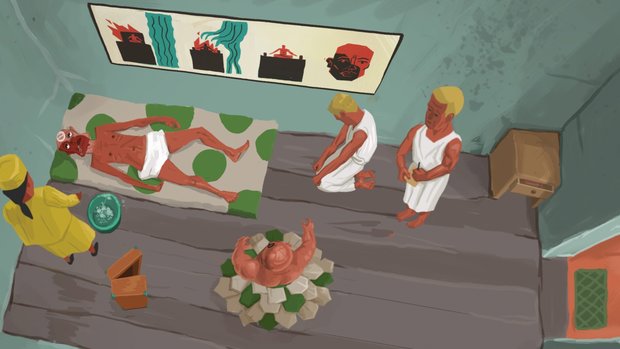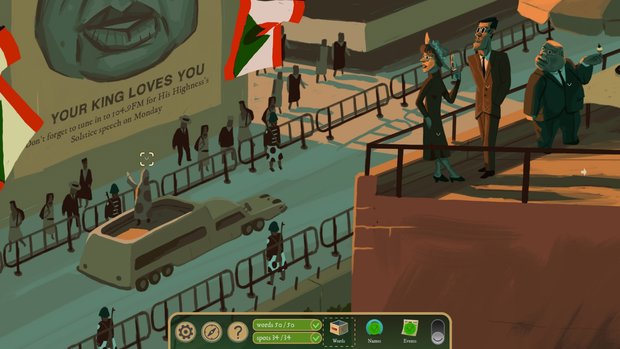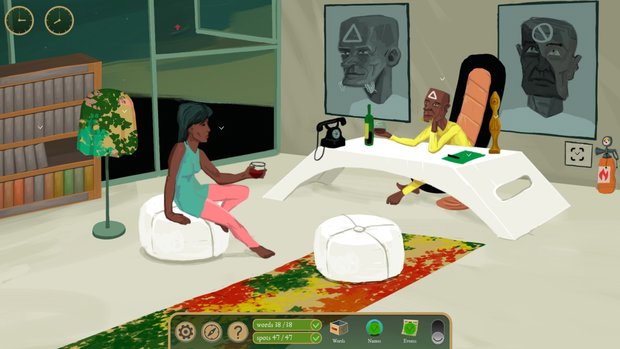Golden Idol Investigations: The Lemurian Phoenix (DLC) review

- 0 Comments
Another fun and engaging new expansion rises, if not quite to the same soaring heights as its illustrious predecessors
An assassin of kings. A chauvinistic grifter guru. A grieving prophet hell-bent on revenge. We’re now halfway into the DLC roadmap for The Rise of the Golden Idol, and there’s no sign of the creators running out of ideas. Golden Idol Investigations: The Lemurian Phoenix is another solid dose of drag-and-drop sleuthery with a great storyline that I recommend without hesitation – even if it doesn’t make quite as strong of an impression as the cracking good first expansion, The Sins of New Wells.
This storyline sends up con artist mystics, out-of-touch tyrannical royals, and the notion of how “chosen one” prophecies can get wildly exploited and flipped on their heads. One central character, Koi, is a clear highlight and a delightfully twisted piece of work. Criminal, manipulative, and sickeningly predatory, he’s the type of baddie you just love to despise, and is probably the slimiest of slimeballs that the series has ever gifted us. There’s a nice assortment of supporting characters here, many who make only the briefest of appearances and some who stick around for the whole story. There’s even the return of Tesa Nevari, a central figure from Rise whose origins I was delighted to explore here.

The setting of The Lemurian Phoenix is quite different from anything else in The Rise of the Golden Idol – in fact, it’s different from anything we’ve seen in any of Color Gray’s past games. Acting as a distant prequel to Rise that takes place across the entirety of the 1940s, the action unfolds in the kingdom of Lemuria – which was really only barely glimpsed in The Lemurian Vampire DLC for the original Case of the Golden Idol. That adventure played out on a desolate island disconnected from the main Lemurian civilization, whereas this tale is set decades later, in much more developed corners of the country.
This chapter also manages to deliver a nice variety of locales, from the opulent decadence of the royal palace in the first case, to the highly contrasting religious sanctuaries of the game’s central opposing figures. One leader’s followers live off the land in a temple built within natural cavern formations, while the other has set up a lavish, state-of-the-art (for the 40s) compound to swindle people out of their life savings with pseudo-spiritual hogwash. It’s all depicted in the same, high-quality painterly style that was introduced in Rise, which gives characters an effective, off-kilter sense of menace that makes no one seem trustworthy.
The gameplay, which once again involves observing crime scenes for cryptic clues and dragging words into empty slots to summarize the events, is just as good as ever. One thing I really like about the Golden Idol games is that sometimes you’ll think you know what the game is asking you to do, just to realize much later that you’ve fallen prey to one of its well-crafted red herrings. That’s in full force here, and it’s quite a lot of fun to get dunked on by the game as you confidently drag the last words to fill the remaining blanks, only for the dreaded “Incorrect” message to appear and send your theories back to square one. There’s so many clues in this installment that can be easily misinterpreted as something else, and the fill-in-the-blank case summaries do a great job of being just vague enough to lead you down a few wrong paths before you finally come upon what you were meant to.
But if this expansion has any notable flaws, it’s that some of its clues are so well-hidden that it sometimes asks players to take wild leaps of faith – you have to be extremely perceptive and good at thinking outside the box to crack it. To the game’s credit, I never had to use the hint feature, but that’s because I made hefty use of a longtime series exploit that lets you brute force your way to the solution. As long as you fill enough blanks in to get yourself within two slots of the correct answer, patient players can drag and drop words in and out of the scrolls until they’ve narrowed down which specific slots are incorrect. After that, it’s just a matter of trying every word that can fit in those final spots until the correct combination is reached.

I relied on this method for two of the cases, and while there was an initial disappointment when my thoughtless strategy cracked the mystery, it at least led to a bit of puzzling out how and why that was the solution, which was still quite fun to think through. Working backwards to figure out character motivations ended up being its own reward, as the story at the heart of The Lemurian Phoenix is a very compelling one; it just doesn’t really come into clear focus until its final moments. It’s very unlikely that anyone will see it going where it ultimately does, which is more of a positive than a negative.
The music here is very effective, painting a memorable picture of the Lemurian culture and nailing the tonal differences needed to set this chapter apart. It also heralds the welcome return of the original series composer. Having stepped away from the games after The Case of the Golden Idol and its DLC, Kyle Misko is back in the orchestra pulpit to score the soundtrack here, and the changing of the guard is somehow seamless yet distinct. It’s certainly reminiscent of his work on The Spider of Lanka and The Lemurian Vampire, leaning away from the twangy 70s cop feel of Rise’s base game and conjuring up a feeling of more ancient, faraway intrigue. There’s a pretty hefty amount of music too, with each case having its own themes, although the score so rarely calls attention to itself that I often didn’t really notice it. It’s less ambient and slightly more melodic than The Rise of the Golden Idol, but its purpose is still to support the mood and atmosphere of the investigation, rather than being the sort of thing I’d likely listen to on its own.
The length of this story is similar to (but perhaps slightly shorter than) The Sins of New Wells, clocking in around three to four hours for me. There are five cases here as opposed to the four in its predecessor, although they tend not to be very expansive in scope and I found myself solving each individual case a little quicker than before. I won’t complain about that, though, as the pacing feels great and it’s impressive that the game fits a properly grand story into a fairly breezy timespan.
Final Verdict
They say if it ain’t broke, don’t fix it, and the Golden Idol formula is about as far from broken as it gets. I once stated that if it became its own genre that took on the ubiquity of a daily Sudoku puzzle, I’d be there for it all. That still holds true after playing The Lemurian Phoenix, which once again shows Color Gray at the top of its game for fascinating conspiracies and spinning up rich, vibrant worlds that I want to see more of. Good thing we’ve still got two whole DLCs on the way for later this year!
Hot take
With a whole new setting and loaded to the gills with royal subterfuge, The Lemurian Phoenix is a fun prequel that gives us something very different from The Rise of the Golden Idol while still delivering what returning players are after. Slightly outshone by the base games and prior series DLC, it’s unlikely to be remembered as a high point in this stellar franchise, but series fans would be seriously missing out if they skip it.
Pros
- Unique setting gives this expansion a very distinct flavor
- Contains plenty of fun, head-spinning reveals
- Deftly weaves in lots of clever links to the base game’s story
Cons
- Everything makes sense in retrospect, but players are asked to make some wildly tricky leaps of logic to get there
Sean played Golden Idol Investigations: The Lemurian Phoenix on PC using a review code provided by the game's publisher.













0 Comments
Want to join the discussion? Leave a comment as guest, sign in or register in our forums.
Leave a comment